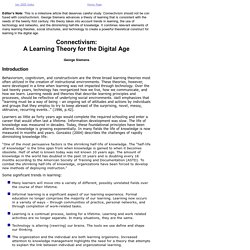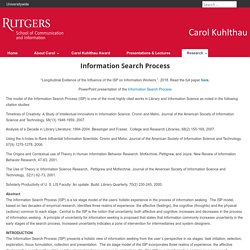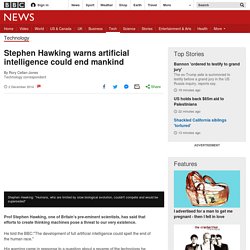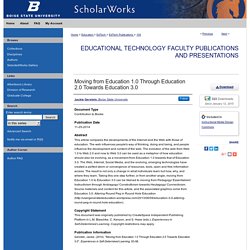

Empowering Students With Technology.
The TL at my school recommended this book to me. Chapter 4 the student as the researcher provides an interesting read on the students as a critical thinker and creating searches for useful information. Learning the grammar of online search engines explains how Google functions and points out that "Students don't understand that no one is home at Google". – mrsjcc
Who Owns the Learning?: Preparing Students for Success in the Digital Age - Alan November.
Chapter one has an interesting approach "Internet sleuthing" whereby meta data and digital threads are examined. The book then describes how to read a web address and achieved docs and suggests that "scanning the link address on a page is similar to reading a footnote" (November 2010 p21) – mrsjcc
Jan05_01. Editor’s Note: This is a milestone article that deserves careful study.

Connectivism should not be con fused with constructivism. Information Search Process. “Longitudinal Evidence of the Influence of the ISP on Information Workers.”, 2018.
A link to the website, provides information on ISP and research from 1990+. There is an interesting power point to down load which explains the process. – mrsjcc
Read the full paper here.

PowerPoint presentation of the Information Search Process The model of the Information Search Process (ISP) is one of the most highly cited works in Library and Information Science as noted in the following citation studies: Timelines of Creativity: A Study of Intellectual Innovators in Information Science. Cronin and Meho. Analysis of a Decade in Library Literature: 1994-2004. Using the h-Index to Rank Influential Information Scientists. Google Fight : make a fight with Googlefight.
I learned about this from another QUT member, but I was impressed and bookmarked it here so that I would not forget. I will use this tool in my year 8 class, as I have a male heavy class. I think this resource is visually appealing and will be useful in the future – mrsjcc
Google Trends.
This is a useful resource as the graphs update and there are many choices for fine tuning the comparisons. I learned about this site from a student who loves the stockmarket, however, I have used it many times since in comparisons and when looking at trends in maths. It is also suitable for key word search as you can see where the vocabulary is popular and look at the difference in meaning of words through out the world. I find this useful when discussing globalisation and online culture. – mrsjcc
BBC Article by Cellan-Jones 2014 on Stephen Hawking. Media playback is unsupported on your device Prof Stephen Hawking, one of Britain's pre-eminent scientists, has said that efforts to create thinking machines pose a threat to our very existence.
With the development of Web 3.0 into the web that learns with us, I was interested in whether the advancements of the web could be linked to artificial intelligence (AI). I discussed the Web 3.0 and semantic searching with a colleague at school, and we progressed onto talking about the AI and how Steven Hawkings had warned against AI. I found this article and documentary posted at the BBC website and thought it would be interesting to share. – mrsjcc
He told the BBC:"The development of full artificial intelligence could spell the end of the human race.

" His warning came in response to a question about a revamp of the technology he uses to communicate, which involves a basic form of AI. But others are less gloomy about AI's prospects. The theoretical physicist, who has the motor neurone disease amyotrophic lateral sclerosis (ALS), is using a new system developed by Intel to speak. Machine learning experts from the British company Swiftkey were also involved in its creation.
Prof Hawking says the primitive forms of artificial intelligence developed so far have already proved very useful, but he fears the consequences of creating something that can match or surpass humans. Image copyright ALAMY Image copyright Cleverbot But others are less pessimistic. Evolution Web 1.0, Web 2.0 to Web 3.0 - SafeShare.TV. Underlying Concepts and Theories of Learning with the Semantic Web Sandra Schaffert*, Tobias Bürger, Wolf Hilzensauer, Sebastian Schaffert. Education and the Semantic Web by Vladan Devedzic, Google Algorithm Change History. "Moving from Education 1.0 Through Education 2.0 Towards Education 3.0" by Jackie Gerstein.
Abstract.
Re p95 teacher barriers to change with a focus on education 3.0 A very interesting approach by using hand drawn diagrams to illustrate points. Gem2 – mrsjcc

Thesis full text by Allan Robertson.
I found this paper whilst working on a Google Scholar Search, although it is a little older than I would usually use, after reading through it I found that it resonated with me. I was interested in his 2 case studies- a boy and a girl and using the prospect of IL for gifted and talented students, however I also liked the way 'instant gratification' was discussed. In the conclusion he discusses that students were interested in hits stating: "Instead of employing deep thinking search strategies they become all but mesmerised by the number of 'hits' they succeeded in attaining and as a result did not explore the depth and wealth of information available on the WWW. As a result Alexandria and Mohammed were learning that the web is a place for a quick fix of information and consequently the information that they found and presented lacked depth and integrity." p42 – mrsjcc